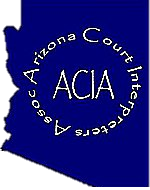The Court Interpreter's Code of Ethics
Download the Code of Ethics here.
- A Court Interpreter has ethical obligations in the exercise of the profession to himself, his colleagues and to those to whom his services are offered.
- A Court Interpreter is bound to be supportive of his colleagues through the sharing of professional knowledge and by refraining from any action that would falsely discredit a colleague or the profession.
- A Court Interpreter is obliged to maintain and improve his interpreting skills through continuing education. A Court Interpreter must recognize his limitations and undertake no assignment for which he is not fully capable. Likewise, an interpreter shall not misrepresent his abilities or experience, and shall always perform to the limit of his abilities.
- A Court Interpreter shall realize the importance of remaining impartial and objective in the performance of his duties, as well as striving to maintain the appearance of impartiality. Any condition which impacts on the objectivity or impartiality of the Court Interpreter or affects his professional integrity constitutes a conflict of interest. If the Court Interpreter is acquainted with any of the parties to the action, or if he is perceived as not being independent of the adversary parties or agencies, he shall disclose to all parties any actual or apparent conflict of interest.
- A Court Interpreter shall never accept gifts, gratuities or favors of any kind for his services in addition to his salary or fee. It is the Court Interpreter's obligation to do nothing that would impair his impartiality.
- The nature of the role of the Court Interpreter imposes upon him the obligation of confidentiality with those for whom he interprets, as well as for his colleagues.
